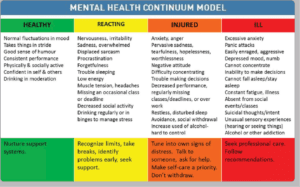Abstract
Employment is important to accumulate wealth, to enjoy a good quality of life and a means through which individuals can contribute towards economic growth and societal development. During the coronavirus (covid-19) pandemic decisions were made by international governing bodies to implement lockdown measures. This meant all non-essential businesses and organisations underwent physical closures. To ensure the operation of businesses to generate revenue to pay employees and be sustainable, there was a transition to online platforms. During this process many employees faced redundancies and complete job losses. This study aims to understand the effect of job loss on the mental health of employees during covid-19. Recommendations are made to ease mental health challenges faced by individuals. A review of literature sources is conducted in this study. Results have identified that job loss can have the following impact on mental health: Psychological impacts like an increase in anxiety, depression, loneliness, low self-esteem; suicidal thoughts and behaviour patterns. These can be due to financial stresses, inappropriate working conditions to find another employment position or inadequate skills restricting employment opportunities. Steps should be taken to ensure individuals take a positive approach to seeking a new job showing self-compassion, ensuring the maintenance of a healthy diet and good routine including sufficient sleep and exercise. This will contribute towards positive mental health and facilitate employment prospects.
Keywords
Covid-19, Employment, Job loss, Mental health,
Introduction
Employment is important to accumulate wealth, to enjoy a good quality of life and a means through which individuals can contribute towards economic growth and societal development. During the coronavirus (covid-19) pandemic decisions were made by international governing bodies to implement lockdown measures (Somani, Our World Before, During and After the COVID-19 Pandemic, 2020). This meant all non-essential businesses and organisations underwent physical closures. To ensure the operation of businesses to generate revenue and continue paying employees, there was a transition to online platforms. During this process many employees faced redundancies and job losses. Within the United Kingdom, 1.3 million people lost their jobs due to covid-19 pandemic between March 2020 and January 2021 (Rodrigues, 2022). The workplace is continuously evolving and comprises of a myriad of roles and opportunities for individuals. The role an induvial is employed into often evolves and job insecurities can prevail. However, a large proportion of employed individuals feel a sense of financial security and stability due to financial independence. Fifty-five percent of employees and seventy percent of graduates reported that employment provides them with a sense of identity which is linked to self-worth, this increases to (Bond, 2021). Thus, when employment is taken away suddenly, individuals have a lot to contend with. Within employment, individuals are frequently faced with challenges that need to be overcome. This can be an intellectually stimulating experience if it is not conducted with immense pressure. Individuals can work in teams to learn from each other and overcome challenges together, and this promotes skill development, In the event of job loss, individuals loose involvement with their colleagues and the opportunity to meet new people. Spending a significant portion of time within the work environment, interaction with colleagues can turn into long lasting friendships and opportunities arise to learn about yourself and the world. However, during lockdown many of the opportunities that individuals attained with working in face-to-face environments were lost.
Objectives
This study aims to understand the effect of job loss on the mental health of employees during covid-19. Recommendations are made to ease mental health challenges faced by individuals. A review of literature sources is conducted in this study. Published literature including journals, books, websites, and articles have been searched and utilised within the findings of this study.
Results and Discussion
Results have identified that job loss can have psychological impacts like an increase in anxiety, depression, loneliness, low self-esteem, suicidal thoughts, and negative behavioural patterns can all impact a high proportion of individuals. There are several reasons related to this including financial stresses, inappropriate working conditions to find another employment position and inadequate skills restricting employment opportunities.

Fig 1: (Chen, Chang, & Stuart, 2020)
Psychological impacts
When individuals have a stable income, they are financially independent which facilitates them towards reaching high comfort levels. This allows them to plan and execute their financial endeavours, have a sense of financial stability which leads to a positive impact on mental health. However, when individuals lose their employment positions suddenly, they can undergo a sense of shock which can have negative mental health implications. Although job loss can present individuals with subjective experiences and alterations in income, the associated mental health impacts can differ between individuals.
Therefore, an individual that loses their employment position may feel threatened and immerse themselves in a situation that only they perceive as dangerous. When an individual feels that they are facing financial threat, they are identified with the feelings of fearfulness and anxiousness pertaining to their current and future financial situation (Marjanovic, Greenglass, Fiksenbaum, & Bell, 2013). Thus, it is not surprising that financial threat is linked with anxiety, depression, negative impacts on mood, suicidal thoughts, and complete burn out (Iksenbaum, Marjanovic, Greenglass, & Garcia-Santos, 2017). Figure 1 illustrates the mental health continuum model which highlights symptoms from healthy mental health expressed through the colour green, reacting which is in yellow, injured which is in orange and ill which is highlighted through the red colour. Within figure 1 solutions to promote mental wellness within each category is illustrated. There is an intention to promote recognition and encourage individuals to recognise the symptoms and engage to conversations with the intention to seek professional help if required (Chen, Chang, & Stuart, 2020).
Financial stresses
A dominant factor associated with negative mental health implications relating to job loss is financial stress. The prevalent solution to financial hardship within societies is to take out a loan and incur debt. Upon the inability to pay the money back, individuals face severe financial strains and hardship. According to research, individuals experiencing a financial strain may be at a twenty- fold higher risk of attempting suicide compared to individuals who have no financial hardships (Cohut, 2020). This is because a significant risk factor for attempting suicide is financial strain (Elbogen, et al., 2020). Multiple studies implemented during the covid-19 pandemic highlighted negative mental health implications due to financial stresses (Wilson, et al., 2020) (Somani & Saraswathy, Sort Stress & Stop Suicide’., 2021).

Fig 2: (Cameron, 2020)
Inappropriate working conditions
Working conditions are vital to productivity particularly during the covid-19 pandemic. Research has indicated that approximately 46.6% of the overall population within the United Kingdom conducted some, or all their work from home. 86% of those individuals reported that they worked from home due to the covid-19 lockdown regulations. Figure 2 illustrates the number of hours individuals worked from home in April 2020 (Cameron, 2020) . An individual who carried out any of their employment work at home is referred to as the homeworker. The calculations for more, less, and same working hours is based on the difference between the individual’s usual and actual working hours within a week.
For individuals to work efficiently from home, they require the adequate hardware, software, and internet connectivity (Somani, Managing Mental Health at Work during Periods of Uncertainty. , 2022). In addition, a conducive working environment is important to ensure individuals can concentrate on the work that they are carrying out. The inability to complete tasks from home, in addition to other distractions within the home environment can impinge upon job retention rates. The requirement for skills development for employees to continue working can be difficult to acquire from remote locations resulting in added stress and negative mental health impacts, thus restricting employment opportunities.
Conclusion
This study has found that there is a negative impact on the mental health of employees that lost their jobs during covid-19. This is consistent with previous studies which have indicated that there is a positive relationship between economic hardships and psychological wellbeing, (Cuellar, Mark, L, Sharfstein, & Huskamp, 2020). Negative mental health symptoms have included depression, anxiety, and panic attacks largely experienced due to loss of income during the covid-19 pandemic. Pre- existing mental health implications are heightened, and job insecurities promote negative mental health challenges.
Steps should be taken to ensure individuals take a positive approach to seeking a new job, showing self-compassion, ensuring the maintenance of a healthy diet and good routine including sufficient sleep and exercise. This will contribute towards positive mental health and facilitate employment prospects. Recommendations are made to ensure policymakers should provide sufficient information on how to manage finances and save funds. In addition, societies must be education on dissociating the stigma related to mental health challenges. This can be initiated through collaborative attempts between governmental and non- governmental organisations to raise mental health awareness within local support groups, online and via face- to-face interaction. Organisations should have measures in place to inform employees what happens in an event of unemployment, at the same time employees should always ensure they have a contingency plan of other employment opportunities. Financial implications are a large contributing factor to negative mental health symptoms, therefore it is recommended individuals save or invest their finances to ensure that they remain financially stable. In addition, it is recommended that individuals invest in skill development to acquire more knowledge for prospective employment opportunities.
References
Bond, K. (2021, 03 02).
How can we stop basing our self-worth entirely on our careers? Retrieved from Metro: https://metro.co.uk/2021/03/02/ how-can-we-stop-basing-our-self- worth- entirely- on- our- careers- 14170368/#:~: t e xt=With%20 h a r d % 2 0 g r a f t % 2 0 s o % 2 0 intrinsically,ten%20when%20 looking%20at%20graduates.
Cameron, A. (2020, 07 08).
Coronavirus and homeworking in the UK: April 2020. Retrieved from Office For National Statistics: h t t p s : / / w w w . o n s . g o v . u k / employmentandlabourmarket/ p e o p l e i n w o r k / employmentandemployeetypes/ bulletins/coronavirusandhome- workingintheuk/april2020
Chen, S. P., Chang, W. P., & Stuart,
- (2020).
Self-reflection and screening mental health on Canadian campuses: validation of the mental health continuum model. BMC Psychol .
Cohut, M. (2020, 09 08).
Financial hardship is a top risk factor for suicide attempts. Retrieved from medical news today: https://www. medicalnewstoday.com/articles/ financial-hardship-is-a-top-risk- factor-for-suicide-attempts
Cuellar, A., Mark, L, T., Sharfstein,
- S., & Huskamp, H. A. (2020).
How to Mitigate the Mental Health Care Consequences of the COVID-19 Financial Crisis. Psychiatr. Serv, 1317–1319.
Elbogen, E. B., Lanier, M.,
Montgomery, A. E., Strickland, S., Wagner, H. R., & Tsai, J. (2020).
Financial Strain and Suicide Attempts in a Nationally Representative Sample of US Adults. American Journal of Epidemiology, 1266-1274.
Iksenbaum, L., Marjanovic, Z., Greenglass, E., & Garcia-Santos, F. (2017).
Impact of Economic Hardship and Financial Threat on Suicide Ideation and Confusion. J. Psychol. Interdiscip. Appl, 477–495.
Marjanovic, Z., Greenglass, E., Fiksenbaum, L., & Bell, C. M. (2013).
Psychometric evaluation of the Financial Threat Scale (FTS) in the context of the great recession. J. Econ. Psychol, 1-10.
Rodrigues, G. (2022, 10 11). Unemployment. Retrieved from centreforcities: https://www. centreforcities.org/unemployment/ Somani, P. (2020). Our World Before, During and After the COVID-19 Pandemic. LangLit, 29-35.
Somani, P. (2022).
Managing Mental Health at Work during Periods of Uncertainty. . Journal of Economics, Finance and Management Studies, 1046-1052.
Somani, P., & Saraswathy, R. V. (2021).
Sort Stress & Stop Suicide’. Bengaluru: St.Mother Theresa University.
Wilson, M. J., Lee, J., Fitzgerald, H. N., Oosterhoff, B., Sevi, B., & Shook,
- (2020).
Job Insecurity and Financial Concern during the COVID-19 Pandemic Are Associated with Worse Mental Health.
- Occup. Environ. Med, 686–691.
https://doi.org/ 10.57259/GRJ7332
Yesican Pinki
BMD Foundation
Email: yesican.pinki@gmail.com
Research Objectives
Snderstand the effect of job loss on the mental health of employees during covid-19. Recommendations are made to ease mental health challenges faced by individuals.
Bio
Pinki is a UNDP Project Youth Employability Services counsellor. She is an advocate for women empowerment, youth development and girl child protection programs. She is also a consumer Rights champion and Education champion helping the underprivileged within society. She has helped towards restricting the dowery system particularly in the Indian State of Haryana and its surrounding areas. Pinki believes that health is wealth and participates in yoga and meditation classes. She has attended numerous conferences, seminars and workshops in different fields with the endeavour to help make valuable changes in society.



